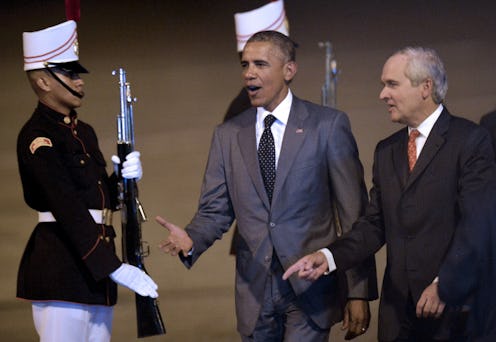News
Will Obama And Castro Share More Than A Handshake?
A historic moment is unfolding in Central America, as the Summit of the Americas gets underway in Panama. United States President Barack Obama arrived in Panama City Thursday evening. During the summit, Obama is expected to encounter Cuban President Raul Castro. The gathering, incorporating communist Cuba for the first time, offers a chance for the heads of state to test the U.S.-Cuba relationship, after the countries agreed to restore diplomatic ties at the end of last year. Obama has already hinted at a breakthrough moment, and is expected to soon drop Cuba from the list of state sponsors of terrorism.
This year’s Summit of the Americas is already notable for having provided the setting for the highest-level meeting between the two previously estranged countries in over half a century. U.S. Secretary of State John Kerry met with Cuban Foreign Minister Bruno Rodriguez in a closed-door discussion Thursday evening, according to BBC. A senior U.S. official called their discussion “lengthy and very constructive.” He said, “The two agreed they made progress and that we would continue to work to resolve outstanding issues.”
The last meeting of comparable stature between the two nations was in 1959, when Fidel Castro met then-Vice President Richard Nixon. That meeting was in New York, mere months after Castro’s guerrilla revolutionary forces toppled dictator Fulgencio Batista. Castro was received in the country, as Mashable recalls, with enthusiasm. Only two years later, diplomatic ties were cut off completely, and a U.S. embargo on the island was officially put in place in 1962.
Then, in December 2014, President Obama announced that a “new chapter” in the relationship would begin — after eighteen months of secret diplomacy. In announcing the plan to normalize relations, Obama said, “These 50 years have shown that isolation has not worked… It’s time for a new approach.” Raul Castro, who had significantly spoken with Obama by phone the day before the announcement, also weighed in. “Obama’s decision,” he said in a speech, “deserves the respect and acknowledgment of our people.”
At that point, Obama ordered a review of Cuba’s status. According to the Guardian, Obama says that work is now done. “That review has been completed,” Obama said Thursday, adding: “I won’t make a formal announcement today about what those recommendations are until I have them.” Despite his reticence, U.S. officials have intimated that the announcement to remove Cuba from the state sponsors of terrorism list may come at the Summit of the Americas.
The anticipated move has been hailed by Senator Ben Cardin, a key member of the Senate Foreign Affairs Committee, as “an important step forward in our efforts to forge a more fruitful relationship with Cuba.” Cuba has languished on the list since 1982, when the country offered itself as a safe haven to militant rebel groups from Colombia and the Basque region. The only other countries currently on the list are Iran, Sudan and Syria, and the impact of removing Cuba could be extensive.
The Guardian points out that the removal of the terrorism tag would allow Cuba’s government greater freedom to operate in Washington. And according to BBC, the move could precipitate the reduction of financial restrictions on aid and loans to Cuba. But if Obama does indeed remove Cuba from the list, Congress is empowered to override that decision within 45 days.
Castro and Obama are not scheduled to hold an official bilateral meeting in the next couple of days, according to the Guardian, but they are expected to communicate in the wings of the summit (as per information from White House officials). As the New York Times reports, any interaction between Castro and Obama will be closely analysed as a symbol of the health of the relationship between the two countries. Bloomberg Business muses that they might meet at the arrival ceremony Friday, or later that evening as leaders pose for a ceremonial photo before a formal dinner.
The heads of state previously came into contact at Nelson Mandela’s funeral in South Africa in 2013, when they shook hands in greeting. On Thursday in Jamaica, before his flight to Panama City, Obama told youth leaders:
We will continue to have differences with the Cuban government, but we don’t want to be imprisoned by the past… Engagement is a more powerful force than isolation. I believe that we can move past some of the old debates that so often define the region, and move forward.
Images: Getty Images (4)
